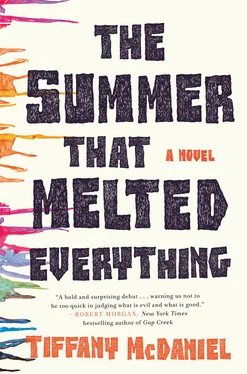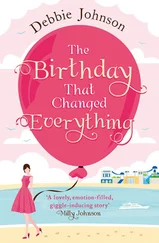“I want you to leave this instant. Both of you.” She stomped her good foot the way all girls are prone to do at least once in their lives.
He reached for her, but she backed away from him.
“Get away from me.” She took a deep breath as if building the courage to say, “I hate you.”
Hate, that all-too-willing pallbearer of love, that all-too-eager shovel piling the dirt over the lover’s head until the funeral is over only a second after it’s started. The boy can go nowhere near happiness when the girl he loves is not willing to go there with him. He may grow up, borrow a tuxedo, a sunrise, a tropical honeymoon, but they’ll never be his without her. She was his truth, his wisdom, and he was stupid without her. Just an idiot with a dumb life.
He stood there teetering, knowing full well that without her, it would be the cliff all the time. He tried once more to reach for her.
“I’m sorry, Dresden Delmar.”
“I don’t care if you are sorry. I want you to leave, and I never want to see you again.”
“All right,” he whispered.
I don’t even think he realized he was walking until we were almost around the corner of the house. It was her shouting for us to stop that made him jump as if being sparked back to life.
“I didn’t really want you to go. You just … surprised me, reading my diary like that.” She kept her eyes on the ground in front of her. “I wasn’t prepared to be revealed like that. I’m sorry I yelled at you. I don’t hate you. Not really.”
He smiled, and I think the whole world knew it. “Will you do something for me, Dresden Delmar? Take off your sweater.”
“Oh, please. If I take it off—”
“You won’t be able to pretend anymore,” he finished her sentence. “Pretend that your mother loves you.”
“She does love me. You just don’t understand.”
“Every bruise you’ve ever had, every sharp shade of purple, blue, black, I’ve had it too. We have had the same boss of pain, we have asked the same question, over and over again, What have I done to deserve this?
“There is no lack of understanding between the two of us. We’ve been part of the same crash this entire time. We just had yet to meet and pull each other from the wreckage. When you take your sweater off and reveal, it is not to reveal you alone, it is to reveal our shared selves. The purpling, black whorls something we can make fine together.”
She was quiet as she watched a small yellow butterfly flutter past. As it landed on a rose, she began to unbutton the cardigan as she said, “I’ve never shown anyone, not even her, and she’s the one who gave them to me.”
“Her who?” I asked.
“Mother.”
She slipped off the cardigan, revealing her strapless dress and her lay of freckles like a beautiful spray of mud. There with the freckles were the bruises. Flat as bruises are, yet piled upon her like things to weigh her, to make her buried beneath blues and violets and colors less terrible than the things they make.
She dropped the sweater to the ground. I walked around to see more bruises at the top of her back.
“Dresden?” I looked away because sometimes you see too much for just two eyes. “You said you haven’t even shown your mom, but if she gave them to you, wouldn’t she know about them already?”
“She only hits me when she’s had too much to drink. I don’t think she remembers when she’s sober. I always make sure to be covered up so she doesn’t have to remember. She wants me to wear long dresses anyways, because of the leg.”
“I think I should tell my dad. He’s a lawyer, ya know, and—”
“Don’t you dare, Fielding Bliss.” She sounded so mature saying my full name.
“All right, geez.” I looked up at the sky and the God who should’ve done better. “Why does she hit you, Dresden?”
“I guess because I’m not as perfect as her roses. Everything must be as perfect as those roses. You’ve seen Mother. Is there or has there ever been anyone more perfect than she? It must be a great pain to her. To have everything so beautiful but me.
“Sometimes, I’ll look at the bruises and see petals. I’ll see roses. And then I’m no longer sad. How can I be? When my mother has given me nothing but flowers.”
Dresden was a girl too in love with her mother ever to see the monster of her. She needed help, so I said as simply as I could, “Your mom’s a bitch.”
“She isn’t. And I’d like it if you never call her that again, Fielding.”
That whole time, Sal had been quietly staring at her bruises, like a boy too well depressed to be able to say something large enough. I knew the way he saw her then would be the way he would fight never to see her as again. From that moment on, she had the shield in him. She had the boy who would turn into a man for her and be the one her mother would never be strong enough to go against.
“I could turn your bruises into real roses.” He went to the patio table to pick up the pair of scissors and roll of tape left there from when Dresden was putting on her construction paper makeup. With a glance around the garden, he went toward the bush of roses so lavender they were almost certainly blue.
“What is the name of these?” He cupped one of the roses in his hand — so large, it eclipsed his palm. “Do you know?”
“I know all of my mother’s roses.” She stood so close by his side that the bottom of her dress blew across his calves. “This one is Blue Girl.”
He quickly cut the stem of the one he held.
“Mother will kill me,” she said in a hushed gasp.
“Isn’t she doing that already?” He looked at the bruises. His frown never greater than when he looked upon them. “Let me make the hurt into every other happiness possible. Let me make you the infinity of the roses, instead of the life with the bruises.”
She allowed him to cut the bush nearly empty, the roses piling in severed beauty at his feet. He laid down the scissors and asked if she could tie up her hair. She took the hair clip from off the patio table to hold her curls and frizz up in a bun.
And then he began. Rose after rose, taped to her flesh by their short stems. Always directly over a bruise, and always carefully, as he knew bruises and their business well.
By the end of it, she was left with roses upon both her arms, a cluster on her chest, and a scattering on her back. When he went to better the bruises on her legs, she stopped him from pulling up the billowy skirt of her dress.
“Let me cut the dress shorter and—”
“No.” She rubbed the leg through the dress.
“We don’t care ’bout it bein’ fake,” I said.
“I do. It’s hideous.”
“It’s a marvel,” Sal corrected her. “Look all around this world. A tree loses a branch, no one replaces it. An angel loses his wings, and he’ll never have another pair.” He turned and showed her his scars. “But a girl loses her leg, and somebody gives her a new one. In this world where so few things are given, how can you not be in awe at what you’ve got?”
She took a few steps away from us, her eyes slowly widening as if through thought she was coming to defy her own gnawing doubt that she was not something special. When she let the dress slip free from between her fingers, I could see a sort of echo inside her. Broad and far, a glowing thing to flick back the shadows of her own self-hate.
“I didn’t lose my leg.” She whispered as if what she was saying were too fragile for anything more than a hush. “I never had one to lose. Still, I like what you say. Hand me those, will you?”
She held her hand out for the scissors, and as soon as Sal gave them, she gathered up the bottom of her dress and began to cut through its pale blue cotton. Thinking it too long after the first cut, she made a second and a third even, bringing the hem to above her gently freckled knees.
Читать дальше












